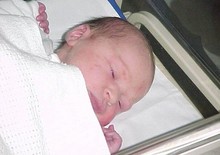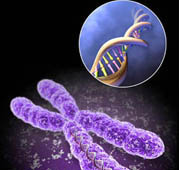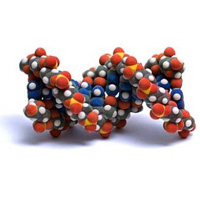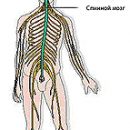Your child put a terrible diagnosis - Hunter syndrome... Reactions of parents and close to this diagnosis. The task of this article is to introduce you to typical reactions. We hope that this article will help someone overcome pain and despair. Remember that you are not alone.
Content
The reaction of parents and close to the diagnosis
Parents' reactions and diagnosed «Hunter syndrome» differ. However, there are general factors observed in various families. The task of this article is to introduce you to typical reactions.
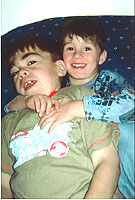 At first, it may be relief, especially if the parents felt that with their child, everything is good, and droopy from the doctor to the doctor, trying to find out what is wrong. It is clear that the diagnosis «Hunter syndrome» no one wants, but at the very first moment parents can calm down a little - because their child was diagnosed, and if so, it is clear, in which direction it will be necessary to go on. Information - the Great Power, they reason, and often the detection of the cause of the child's disease means carrying out a particular treatment, after which their child will be healthy.
At first, it may be relief, especially if the parents felt that with their child, everything is good, and droopy from the doctor to the doctor, trying to find out what is wrong. It is clear that the diagnosis «Hunter syndrome» no one wants, but at the very first moment parents can calm down a little - because their child was diagnosed, and if so, it is clear, in which direction it will be necessary to go on. Information - the Great Power, they reason, and often the detection of the cause of the child's disease means carrying out a particular treatment, after which their child will be healthy.
However, it is very soon an understanding that is not so simple. That the treatment of such that the child healed immediately, no. Most parents are experiencing an insurmountable feeling of devastation, and then pass through all stages of sorrow. Physiologist Ken Moses developed the theory of the grievance process experienced by parents of children with serious diseases. Among the most intense feelings experienced by the parents are the loss of their dreams about what their child will be. Together with this, an intensive emotional period comes, which is often incorrectly interpreted by the parents themselves and those who surround them. This will help them, experienced loss, to realize their feelings and reactions as the corresponding situation around them. The following is the experience described by many parents when they learn to ensure the special needs of their child, as well as understanding and as best than one can fulfill these needs.
Loss of dreams
When parents are waiting for a child, they dream, as a child will grow to whom it will be like, how will learn. Many do not even discuss their dreams with each other, although it is assumed that the other knows about them.
According to Dr. Moses, the main dream of all parents is that children live better than they. Dr. Moses says: «The only thing that a person can lose in life is a dream. You can't lose the past, you can lose only the future… Dream, fantasy, illusion or imagination of the future».
When parents are remembered about the future, this is a loss of dreams. This process has many parts, but always begins with a blow, which produces information presented by the doctor. And is usually accompanied by a refutation of the correctness of the information provided.
Refutation
This is the necessary part of the sorrow and should be considered as useful. Many parents do not want to admit that they denied the presence of their child or other inaptity. But looking back, they can see what they did and spoke the most refutation. Dr. Moses examines refutation as a time gain, the need for a person to find inner strength and external support to live with what happened.
The refutation can manifest itself in a variety of forms and lasts both for a short time and for many years. It must be remembered that a person simply uses his mechanisms to get along with the current situation, and this process is normal, purposeful and producing.
Dr. Moses allocates four levels of refutation, which are the most common:
- Parents may argue that their child is harmful. «Must be, the doctor was wrong» - It is the usual answer. Some parents are looking for a second or third opinion.
- Parents can make a diagnosis, but deny that it is for life.
- Parents can make both the diagnosis and the fact that it is for life, but deny the influence of the child's disease to their lives.
- Parents can deny their feelings. «Yes… But there is no point in sorrowing spilled milk.»
It is important to remember that these are normal, useful reactions to the situation and they must be supported.
Since the family is still adapted, offer parents more specific information about the disease and its consequences, as well as on available information and other resources. The collection of information is very helpful to parents to recover from the impact made by diagnosis, and survive the refutation stage.
Anxiety
Another stage of sadness - panic or anxiety. When parents understand that there are no changes with the child, they can go into panic. These are very important to type issues «What i'm going to do?» or «How he will receive education and what awaits him in the future?»
Anxiety can be useful because it helps to mobilize and direct the energy necessary for the internal and external changes required by the situation. Parents may feel upset or even inadequate, they are afraid of unknown. Awareness of anxiety, the right to feel worried, can be useful for families dealing with this stage of sadness.
Anger
It was observed that in this stage, the reaction to those or other situations are sometimes exaggerated compared to how a person could react in the usual state. If a person tends to arrive angry in any specific situation, then it can become very angry during the process of sadness. Anger is probably the most common and expected form. Parents can show anger on professionals who diagnosed their child, they are angry with their biological history or the god who has an unbearable burden.
Most often, however, irritability and anger are directed to the closest and most defenseless - on family members. Minor events suddenly seem important and catastrophic. During this stage, the process of sorrow is extremely difficult to stay close and favorable to each other. Keep in mind that anger can be substed with feelings and powerlessness, and in some situations uncontrolled.
Guilt
Wines often binds to what we did in our own life. It makes us come back to all the bad things that we may have done. May be a tendency to judge their own advantages and yourself.
Often wines takes the form of type questions «why me?» or «What I did to deserve it?» A person does it - why there is and where it comes from this or that phenomenon who manages our lives, and perhaps even our faith. Sometimes the answer to these questions is that some things have no explanation. It is sometimes difficult to accept. Families need to be allowed to divide these feelings without evaluation.
Depression
Depression is the central part, the core of the sorrow. It is necessary to encourage parents for their stories about oppressed feelings and confirm their need to take a different look at their own expectations from themselves and others. When people are oppressed, they are often tearful, sometimes they have no interest in everyday affairs. There may be physical signs - insomnia or even disease. This is a normal feeling of sadness, only very long signs of depression are the cause of concern.
Fear
Parents have a lot of concern. The main fear can consist in the following. The harm caused by intellect is so big that they will never be able to love him. And perhaps someone in general. Ken Moses writes: «When you let yourself risk having dreams, but it does not work. The fear is that the pain will be so big that you will never allow yourself to risk hope or dream». The feeling of fear or its separation is the way on which parents can find inner strength and courage to start loving their child.
Regulation
In this stage of the process, the parents begin to see that the sick child is like them and other children. «His eyes are blue, exactly the same as the father», or«He loves the same food as my other children».
Emotions are becoming less intense, and family members can give more energy to daily tasks and joy. The family begins to admire their child. They begin to develop new ways to enjoy each other.
Return of sorrows cycles
Those or other stages of sorrow can return to those or another moments. The most important events, like the beginning of pre-school training in kindergarten, or when a child reaches school age, puberty, matures, and also when a child is forced to leave a kindergarten or school, when parents leave work, - can cause sorrows reaction from parents. Vacation, child's birthday, family fees can also force parents to re-survive the loss of their dreams.
It is important to recognize that members of the same family can be upset very differently and pass through the stages of sadness differently. Recognition «Cellary» The mechanisms of each family member and the use of them will help reduce the voltage that may occur when studying the diagnosis.
Emotional reactions to a child with Hunter syndrome are intense and often confused with indignation and disorder brought by the burden of guilt, mixed in with pity, love and pain. Hunter syndrome may be caused by the problematic behavior of the child. This, in turn, means that the parents of such a child live in the state of infinite exhaustion, trying to manage the whole range of teachers, doctors and other specialists to maintain the correspondence of their family to generally accepted the concepts of the family and at the same time provide specialized and constant care required Sick child.
Conclusion
Passing through this difficult period, it is very important to have hope. It is very important to communicate with families in which there are similar problems, study information about the disease and the aspects associated with it. Remember that medicine does not stand still, new and develop existing treatment methods, which leads to improved quality of life. Remember that you are not alone.



